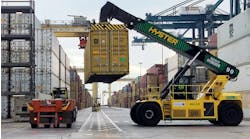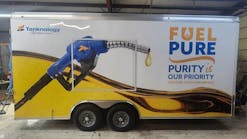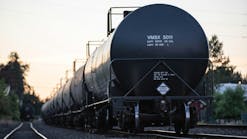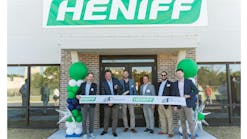Xcel Bulk Logistics, which provides all-inclusive dry bulk services, last year introduced “transformational” smart silos for portable storage through its XBL Storage Solutions division. The new mobile offering was slow to catch on, but word is spreading, and the business recently secured its biggest win, leasing three units to Giant Cement, which is building a 60,000-ton import terminal in Savannah, Georgia.
Giant is using the mobile storage silos to support its cement operation on the Savannah River before the facility is completed, while also establishing its presence—and generating buzz—in a key market through co-branding. “Our cutting-edge silo infrastructure will play a pivotal role in revolutionizing Giant’s operations, helping optimize logistical efficiency and streamline their supply chain processes,” XBL stated in a LinkedIn post that caught the attention of dry bulk carriers and Giant’s customers.
“They’re just a huge advantage for Giant,” Randy Plotner, XBL vice president of business development, confirmed to Bulk Transporter.
The partnership with one of the largest cement producers in the country also is helping XBL establish a foothold in the Savannah market—a critical goal in its growth strategy that’s “tantamount” to the success of its operating plan in 2024 and beyond, Plotner added. “We don’t want to be just a trucking company,” agreed Galen Murphy, XBL co-founder and vice president of strategy. “We want to be a solutions provider for our customers, whether that be storage, transloading, or transportation.
“We want to be a one-stop dry bulk shop.”
Savvy portabulk upgrade
XBL bills its silos as an intelligent alternative to storage pigs, providing more capacity and automated efficiency, while taking up less real estate and serving as a sleek new marketing device. “They give your sales team an opportunity to start selling your product in a new area before your facility is done,” Plotner said.
See also: XBL, partners turn heads in dry bulk logistics
The machines hold up to 225 tons of dry bulk product. Each one comes fitted with a Paragon blower, air compressor, rotary vane feeder, dust collection cartridge system, and radar sensor for digitally measuring silo levels—all in a 14-sq.-ft. vertically oriented package that stands on compacted ground. “These silos are for our construction- and industrial-division customers,” Plotner emphasized. “They’re not just for cement. They can handle sand and limestone, and myriad other dry raw materials.”
The silos offer temporary or supplemental storage. Giant plans to move them into adjacent operations when its Savannah cement dome is finished, Plotner said. They also provide “safety stock” when plumbed to a facility’s primary storage or production, automatically delivering material as needed. Giant’s silos are daisy-chained to work in unison, with rail cars unloading into Silo 1, which automatically refills Silos 2 and 3 as they’re emptied by outgoing trucks. “It’s a beautiful symphony,” Plotner said.
Additionally, XBL’s silos are accessible by two trucks at one time, and retrofittable for both pneumatic dry bulk and hopper trailers. “We’re moving from functional to optimal with these silos,” Murphy said.
“It’s like going from a shovel to a backhoe.”
Precious dry bulk commodity
XBL currently has 10 mobile storage silos in its lease fleet, and five are leased.
The Texas-based company, backed by private-equity firm Lilium Group, offers one- and two-year leases, and two-year leases with a purchase option. Lease agreements include setup support and mechanical repairs. Customers are responsible only for preventative blower maintenance. XBL also offers FOB (free on board) and delivered pricing, depending on bundled transportation services, and vendor-managed inventory. “Instead of keeping an eye on what your orders look like this week or next, we manage match your silo levels to your production schedule, and bring in trucks as needed,” Plotner said.
“So the task is completely off your plate and you don’t have to worry about it.”
Self-contained automation, combined with web-based telematics, also frees operators who previously were hand-cuffed by manual valve and pressure checks to better serve their customers, Murphy added.
“This is an investment in efficiency and time savings—for our customers and us,” he said.
That’s why XBL already sourced 10 more units from an oilfield company in West Texas, Plotner shared. But XBL still needs to prep the new units, which takes time, and the company already has deals in the works—either in negotiations or waiting for capex approval—for 15 silos going out to new customers. “Right now, we only have a handful remaining to allocate that can be on the ground today,” Plotner concluded.
“So, for each of these customers, it’s a race to the finish.”












